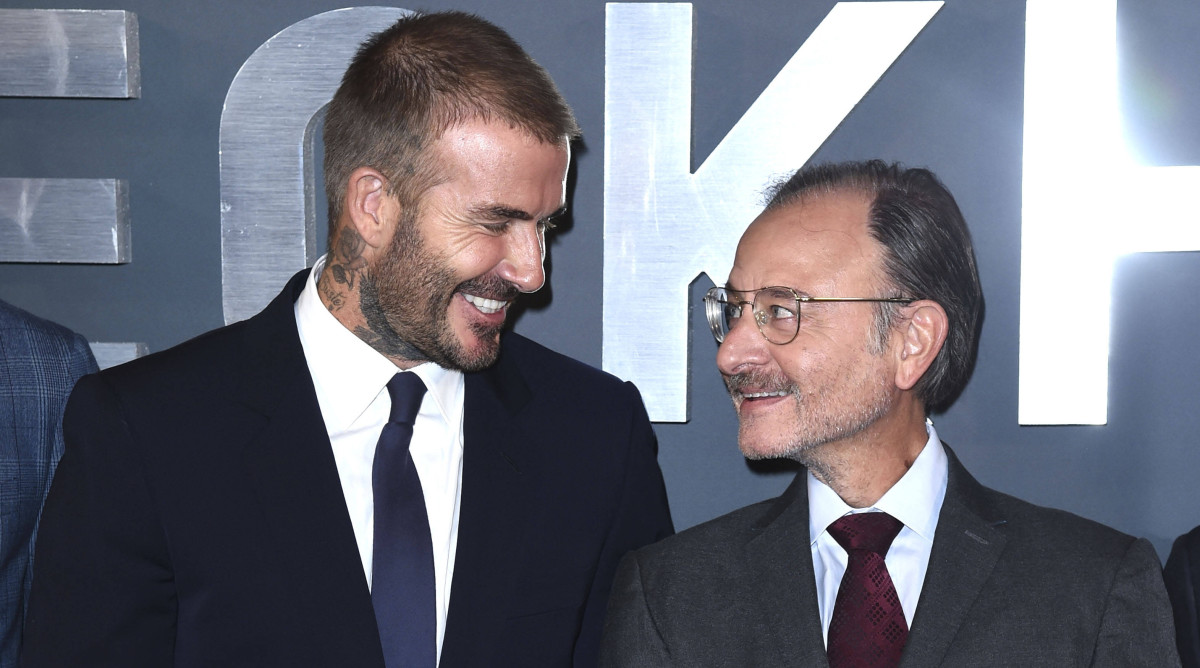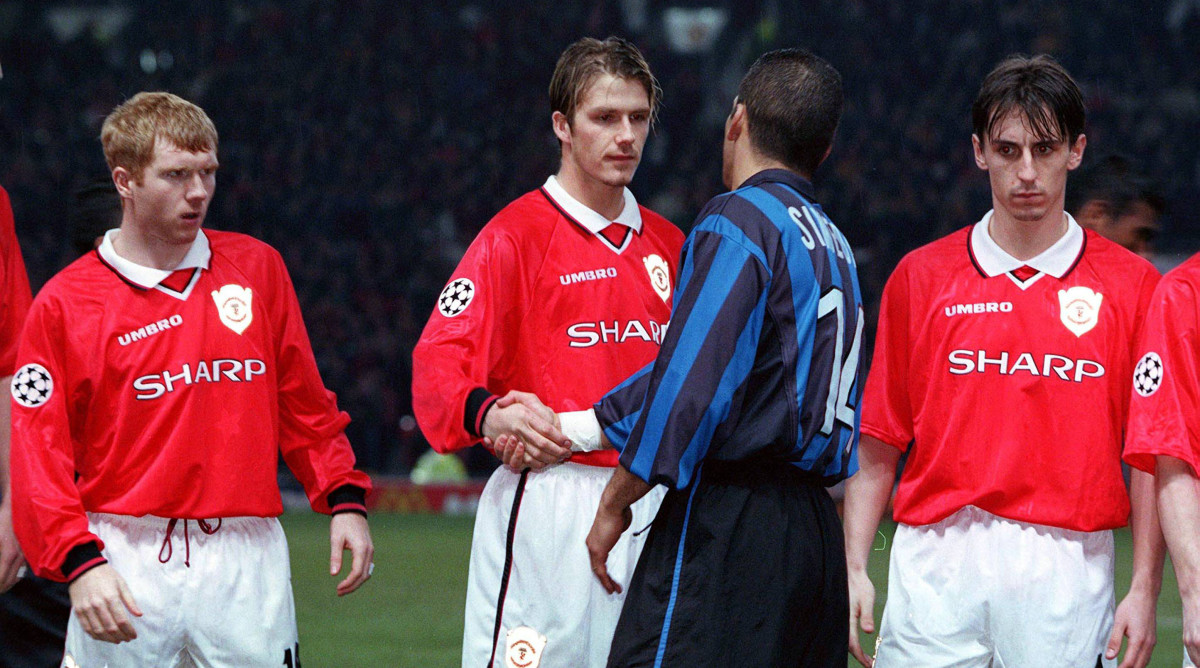Q&A: Filmmaker Fisher Stevens Talks ‘Beckham’ Netflix Documentary Series

David Beckham is back to doing what he does best, taking the world of sport and pop culture by storm. But this time, rather than as a global soccer phenomenon or as owner of MLS side Inter Miami, it’s as the subject of a four-part, Netflix limited documentary series.
BECKHAM chronicles not only the superstar’s marriage to Spice Girls star Victoria Adams and his iconic rise at Manchester United and the stardom that followed him to Madrid and Los Angeles, but also the laying of a foundation for the modern-day soccer star as a brand.
In all, it took documentary filmmaker Fisher Stevens—also known for his role as Hugo Baker in the HBO series Succession as well as his producing credits on Tiger King and the Oscar-winning documentary The Cove—two years from start to finish. Now, it’s debuted with 12.4 million views since its release last week as the next great sports documentary.
Sports Illustrated sat down with the director to talk all things Becks, including the star-studded starting XI of interviewees and a phone call from an Oscar-winning actor that kicked it all off.
This interview has been edited for brevity and clarity.
Sports Illustrated: Let’s start at the beginning. How did you get attached to the project in the first place?
Fisher Stevens: [Two years ago] I was on my way to work to shoot my acting job in the morning, and the phone rang. And it was Leonardo DiCaprio’s office asking if I was interested in talking to David Beckham about doing his film. Leo and David had met the night before at a party. And I guess David had been looking for a director for a bit, and Leo recommended me. David had just seen Palmer that I had just done with [Justin] Timberlake and had seen Before the Flood with Leo. Frankly, I wasn’t that interested off the top of my head, because I was like, David Beckham, brand Beckham, they won’t let me do what I want to do. I didn’t really know how great a footballer he was, because I kind of got into football in 2003, but he’d just just left for Madrid. But I was sort of curious, and then when I got to work that day—I worked with a bunch of English people on the set of the TV show I was on—they were like, “He’s brilliant. You gotta do it. He’s an icon.” And I looked him up, watched his playing. I got into it. I met him on Zoom. And then when I met him and Victoria in person, I was pretty much convinced. But honestly, at first, I wasn’t so thrilled. But also I had the caveat that he didn’t have final cut, [him] or his people.
SI: Yeah, especially with such a controlled brand, how did you navigate that space?
FS: I wouldn’t say it was easy. It’s still, you know, they are brand Beckham. But I think David knew that this was a moment for him to kind of let his guard down, and he wanted people to see who he really was. I was fortunate that we just kind of got along and clicked and I think he trusted me, maybe because I was an actor and he’d seen me on television. I don’t know. But he seemed to really be comfortable with me. And the other thing he did that was really important was he gave me about 40 hours of his time. And David Beckham, I don’t think he ever sat more than 30 minutes. Not just let alone for an interview, but in life, the guy can’t sit still. That’s kind of why I named the fourth episode “What Makes David Run” because this guy is always on the go. And he’s a guy that doesn’t think about the past. He doesn’t go inside. He’s not introspective at all. And I think he hated and loved our sessions. He kind of dreaded them. But at the same time, I think he really liked them because he started to really reflect back in a way he’s never reflected back in his life. And that’s another reason we needed so much time, was that I needed to keep opening him up, so to speak.

SI: What was the setting of your first in-person meeting with the Beckhams? What was your impression of them, and then how did you get to the point where you can earn their trust to let you in and be vulnerable?
FS: Well, I wanted a place that was really his safe place, which was his—he calls it his man cave. It’s his place in London where he kind of watches football and closes the door and just chills out. It’s very small. It’s full of his caps, every cap that he had from England. And he goes down there and just chills, and he felt, I think, more comfortable there, even though there were cameras staring at him. But I had a great crew. David met them before and felt very comfortable. And I tried to keep consistency with the crew pretty much for almost every interview, so he felt safe. Like it was a safe space. Yeah, it took time to warm up, but eventually we got there. He’s only 48 years old. But, you know, you see the life he’s led. It’s just crazy. It is a roller coaster. And that’s kind of what I loved about it, was the ups and the downs. And, you know, people don’t really realize what the s--- that he went through, you know? And I didn’t realize and once I started digging in and looking into it, it was like, “Oh my god. Unbelievable.” So it was exciting.
SI: Every chapter starts with David Beckham behind the scenes. Him as a dad, as a perfectionist, as a beekeeper, an obsessive grillmaster. It’s those interactions that kind of jolt the viewer into reflecting that this isn’t just a sports story. Sports is just the lens into this overly human phenomenon.
FS: Yeah, I didn’t want to do a reality show where we follow him around. It was very curated what we showed and the parts of David's life that we showed. I mean, the one thing I regret is I really wanted to film him doing Lego, but we kind of ran out of real estate and ran out of time. If we did a fifth episode, that would be how I’d open it. Because he loves Lego and is apparently pretty good. He's a bit of a Lego master. It’s very easy to turn these things into reality shows, and I wanted it to be different. I wanted it to be unique. I didn’t want it to be a typical sports doc, either. It’s about a human being who is kind of an icon in a weird way. But I wanted to humanize him as much as possible and show the world that he isn’t necessarily what you may have thought.
SI: Going back to what drew you to it, 1998–99 was a year that’s made for Hollywood: red card at the World Cup. England’s public enemy number one, first child, United wins an impossible treble, a wedding bigger than a royal wedding. Was it that kind of drama that drew you to a story once you dug into it?
FS: Oh, yeah. And that that was the stuff that I learned about before I accepted the job. David said that we could use footage that no one has seen like from his wedding and those point-and-shoots that you could film. Also, he was the runner-up for Ballon d’Or in 1999. That just shows you how great a player he was and what a season he had. And he had a couple of those seasons, where he was just great. And some people had no idea, especially in the United States. We just think he’s a pretty face. They made a movie about him and girls lust after him, but he was a great player. And he’s a really good person. I really enjoyed our time together in a lot of ways. It was interesting that he was so down to earth about some things and about other things where he just hadn’t thought about it. Victoria [Beckham] even says in one of the episodes: “We haven’t thought about this in years.”
SI: In the background of the doc, there’s the ethos of Manchester. The rock stars, the nightlife, the paparazzi in this post–Princess Diana era, the emergence of the internet and the phenomenon of soccer stars becoming a brand, in a sense. To me, that’s the thesis of this documentary, that Beckham paved the way for the modern-day celebrity soccer star and for everything that the sport calls normal and that fans criticize today. There’s no Cristiano Ronaldo or Neymar in the same context without him. [Beckham’s] the blueprint. Did you get that sense?
FS: One hundred percent. Beckham combined the tattoos, the styles, the hair, the individuality, the fashion, the sponsorships. He changed the whole game. I’m a huge Liverpool supporter and I’ve met a bunch of the players. And I told a bunch of them that I was making this film, and they worship David Beckham. To the young guys, he means a lot to them, not just because he was a great player, but because of his style and what he accomplished and not being afraid to be who he is.
SI: There’s Sir Alex, there’s Zidane, Florentino Pérez, Ronaldo Fenomeno. For soccer fans, this is kind of a Wes Anderson ensemble cast. Who had the interview that left you most impressed? And who was the most intimidating person you talked to?
FS: I gotta say I think I was most nervous about Sir Alex and about Florentino Pérez. I wore a tie for Sir Alex out of respect. He was a big fan of Succession. So that immediately disarmed him, which was great. [Scottish actor] Brian Cox and him were friends, so I gave him Brian’s book. Brian signed him a book to give him, so that helps. I was a bit nervous for a lot of people. [Luís] Figo is an imposing character. I loved him. He was super nice. But he’s Figo, you know? The one guy I really felt super comfortable with, because I interviewed him before without the cameras to get info, was Gary Neville. It was like being with another actor. You just chew the fat. It was pretty easy. Roy Keane, I was very nervous and then when I met him, he was the sweetest guy. He probably doesn’t feel like I used him enough, but when he’s in it he steals the show. He’s kind of a genius.
SI: Was there anyone that you really wanted to get but didn’t?
FS: Well, I asked [former England manager] Glenn Hoddle a number of times. I never got him. [Paolo] Maldini had no interest in it. He played with David at AC Milan. David wanted him in it, but he was the only other guy.

SI: A massive part of documentary making is the art of editing, boiling down hours and hours of footage into clips and then ordering them into this sprawling narrative. And for something of this scale, where do you even start? What does Week 1 look like?
FS: You need the best team, right? So I hired right away Billie Shepherd, who knew nothing about football but was a huge Spice Girls fan. And I had to convince her. I said, “Look, you're gonna meet Victoria.” [Billie’s] a brilliant researcher and producer. So Billie and I kind of sketched it out with John Battsek, the producer. And then after my first interview with David, I threw most of it away because he was so much different with the camera than I thought. Because I interviewed a lot of kids that David started out with and I was making more of a working-class story. I got really into David getting sent [on loan] to Preston at 19 and Ryan Kirby, his best friend from Ridgeway Rovers. I was doing a portrait of working-class England, which, basically we're doing anyway, but without having to go so deep. And then I just had this brilliant editor, Michael Harte, who did Three Identical Strangers and Don’t F**k With Cats, and I knew I wanted that energy.
SI: One of the more special elements of the series was having that camera right on people’s faces as they watch their past glories. Their reactions, the smiles, the tears and the way their eyes gleam. What was the genesis of that?
FS: I wanted to get into the essence of these guys. And actually, I thought with David especially, you know, you always see David sort of at an angle, and you rarely see him vulnerable like that. So I thought let’s start with David, and then I want to show these guys what it was like and hear what they have to say. Because you’re really seeing the true them. They almost forget that they’re being filmed. They get it but they forget instantly. As soon as they see the image, they’re all about the image and not about us.
SI: The way you piece this project together, there’s this image of home-life Beckham and then superstar Beckham. But his personality, you let it shine and it remains constant throughout—it seems singular. But did you ever get a sense that you’re dealing with two personas, that maybe there was tension between the two?
FS: The essence, the true moment for me was—thank God I got because we had locked picture but then David told me [Inter Miami] got Messi and I was like, I’m going to Miami. And I just flew myself to Miami—we filmed that moment where Messi scores his [first] goal, and you see David’s reaction. That is David’s essence. That moment, to me, was one of the most beautiful, iconic moments of who David was. Because that wasn’t for the camera; that was real. And there are a bunch of those moments with his sons and his wife. He definitely has stress, the stress of owning a team, the stress of making speeches. He puts himself out there and he works hard. He still has that work ethic, which I find very admirable. He works his ass off.
SI: Once you release a project like this to the world of this scale—on Netflix, a person like this, a phenomenon like this— it’s no longer yours. The audience decides what goes viral, what will trend, what story lines are rehashed. What has surprised you the most about the reaction?
FS: To be honest, I spend most of my life as a director, begging people to watch what I do, especially my environmental stuff. I do a lot of environmental films and my political stuff. It’s just weird for me to have something that people are watching anyway and liking. And it’s spreading. It’s exciting. I didn’t expect it to go so fast, like people are watching it fast, which is wonderful. We only finished like eight weeks ago, and that was a real downer. So it’s nice talking about it now.
